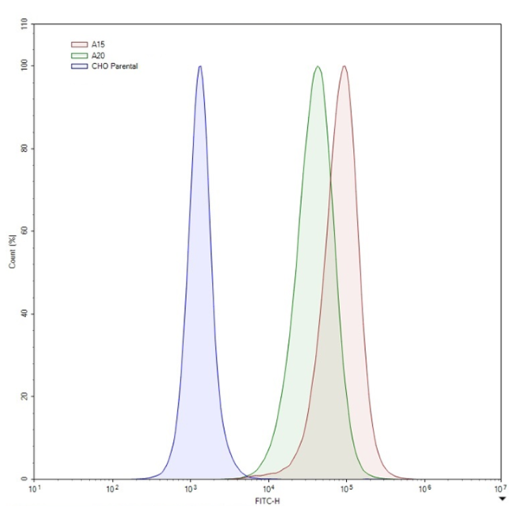CD37 CHO Recombinant Cell Line (High or Low Expression)
Recombinant clonal stable CHO cell line constitutively expressing full length human CD37 protein, also known as GP52-40; TSPAN26; leukocyte antigen CD37 (Genbank #NM_001774). Surface expression of CD37 was confirmed by flow cytometry. Each stable clonal cell line was selected for different levels of CD37 expression, (High and Low), to mimic different stages of cancer target cells with various CD37 expression levels.
This product has been cited 1 time.
Purchase of this cell line is for research purposes only; commercial use requires a separate license. View the full terms and conditions.
| Name | Ordering Information |
| Thaw Medium 3 | BPS Bioscience #60186 |
| Growth Medium 3D | BPS Bioscience #79539 |
The cell line has been screened to confirm the absence of Mycoplasma species.
CD37 expression is restricted to cells of the immune system, with highest abundance on mature B cells, and lower expression is found on T cells and myeloid cells. CD37 is a cell surface glycoprotein that is known to complex with integrins and other transmembrane 4 superfamily proteins. It is also expressed in B-cell non-Hodgkin Lymphomas, in chronic lymphocytic leukemia (CLL), and in some cases of cutaneous and peripheral T-cell lymphomas.
CAR-37 T cells have demonstrated antigen-specific activation, cytokine production, and cytotoxic activity in models of B- and T-cell lymphomas in vitro and in vivo, including patient-derived xenografts. T cells expressing anti-CD37 CAR have substantial activity against 2 different lymphoid lineages, without evidence of significant T cell fratricide. Furthermore, anti-CD37 CARs have been combined with anti-CD19 CARs to generate dual-specific CAR T cells capable of recognizing CD19 and CD37 alone or in combination. CD37-CAR T cells represent a novel therapeutic agent for the treatment of patients with CD37-expressing lymphoid malignancies.
1. Scarfò, I. et al. Anti-CD37 chimeric antigen receptor T cells are active against B and T cell lymphomas. Blood. 2018 Oct; 132(14):1495-1506
2. Witkowska, M. et al. Investigational therapies targeting CD37 for the treatment of Bcell lymphoid malignancies. Expert Opin Investig Drugs. 2018 Feb;27(2):171-177
Application References:
1. Novel CD37, Humanized CD37 and Bi-Specific Humanized CD37-CD19 CAR-T Cells Specifically Target Lymphoma (2021)


